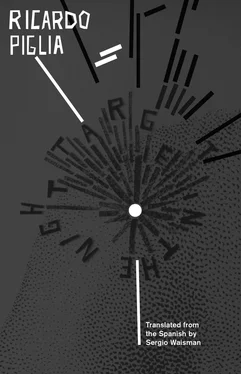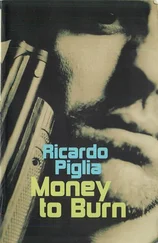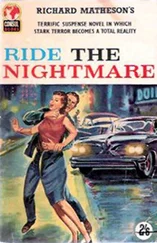Ricardo Piglia - Target in the Night
Здесь есть возможность читать онлайн «Ricardo Piglia - Target in the Night» весь текст электронной книги совершенно бесплатно (целиком полную версию без сокращений). В некоторых случаях можно слушать аудио, скачать через торрент в формате fb2 и присутствует краткое содержание. Год выпуска: 2015, Издательство: Deep Vellum, Жанр: Современная проза, на английском языке. Описание произведения, (предисловие) а так же отзывы посетителей доступны на портале библиотеки ЛибКат.
- Название:Target in the Night
- Автор:
- Издательство:Deep Vellum
- Жанр:
- Год:2015
- ISBN:нет данных
- Рейтинг книги:3 / 5. Голосов: 1
-
Избранное:Добавить в избранное
- Отзывы:
-
Ваша оценка:
- 60
- 1
- 2
- 3
- 4
- 5
Target in the Night: краткое содержание, описание и аннотация
Предлагаем к чтению аннотацию, описание, краткое содержание или предисловие (зависит от того, что написал сам автор книги «Target in the Night»). Если вы не нашли необходимую информацию о книге — напишите в комментариях, мы постараемся отыскать её.
is an intense and tragic family history reminiscent of
, in which the madness of the detective is integral to solving crimes.
, a masterpiece, won every major literary prize in the Spanish language in 2011.
Ricardo Piglia
Target in the Night — читать онлайн бесплатно полную книгу (весь текст) целиком
Ниже представлен текст книги, разбитый по страницам. Система сохранения места последней прочитанной страницы, позволяет с удобством читать онлайн бесплатно книгу «Target in the Night», без необходимости каждый раз заново искать на чём Вы остановились. Поставьте закладку, и сможете в любой момент перейти на страницу, на которой закончили чтение.
Интервал:
Закладка:
“Stop kidding around, Mr. Luna.”
“See if you can make something up that we can use, everything’s under water around here. Send a photograph of the dead man.”
“No one really knows why he came to town exactly.”
“Go with that,” Luna said. But, as usual, he was already onto something else, he did ten things at once and said more or less the same thing to everyone. “Hurry up, kid, we’ll be going to press soon,” he yelled. Then there was a strange silence, like a hollow, and Renzi realized that Luna was pressing the mouthpiece of the telephone against his body and speaking with someone else in the newsroom. He held on, in case there was anything else.
“And where am I supposed to get a photograph?” But Luna had already hung up.
Everyone at El Pregón was watching a television, set up on a sliding cart off to one side of the room. Channel 7, from the Capital, had requested a coaxial connection with the channel from the town. The local newscast was going to be shown nationwide. On the screen, behind the gray stripes that went up and down repeatedly, was the front of the Plaza Hotel, with the prosecutor, Cueto, entering and coming back out, very active, smiling. He was explaining, giving his version of the events. The camera followed him to the corner. There, looking directly into the camera with a smug little smile, the prosecutor concluded that the case was solved.
“Everything has been cleared up,” he said. “But we have some differences with the old policeman in charge of the investigation. The issue is a procedural matter that will be settled in court. I’ve asked the judge in Olavarría to declare preventive custody for the accused and have him transferred to the prison in Dolores.”
The channel resumed its local programming, covering the preparations for a horse-and-duck polo match between the civilian and the military teams at the summit near the town of Pringles. Gregorius turned off the television and walked Renzi to the door of the newspaper offices.
The reporter from El Mundo checked in at the Plaza Hotel, rested for a while, and went back out to take a look around town and interview a few of the residents. No one would tell him what everyone knew, or what was so well known to everyone that it needed no explanation. They all looked at him sarcastically, as if he were the only one who didn’t understand what was going on. It was quite a strange story, with different angles and multiple versions. Like any other, Renzi thought.
By the end of the afternoon Renzi had gathered all the available information and was ready to write his article. He returned to his hotel room, looked over his notes, and made a series of diagrams, underlining several phrases in his black notebook. Then he went down to the dining room and ordered a beer and French fries.
It was after midnight when he went back to the offices of the local newspaper, knocked on the iron shutters, and was let in by the night guard, Don Moya, who always hobbled around with an odd-looking limp, having been thrown in ’52 by a horse that had left him with a bum leg. Moya turned on the lights of the empty newsroom for him, and Renzi sat at Gregorius’s desk and typed out the article on a Remington with a missing a .
He wrote his first story in one fell swoop, looking at his notes, trying to make it what his editor Luna called a colorful article with a hook. He started with a description of the town because he realized that this would be of interest in Buenos Aires, where almost all the readers were like him, city people who thought the countryside was peaceful and boring, sparsely populated with folk who wore Basque berets, smiled like idiots, and said yes to everything. A world of simple, honest people who spent their lives working the land, faithful to the Argentine tradition of the gaucho and loyal friendships. Renzi realized that it was all a farce, in just one afternoon he had heard more mean and hostile comments than he could have imagined. In one version Durán was what is known as a carrier, someone who brings in undeclared money to negotiate, on behalf of a fictitious company, the prices for the purchase of the harvest to avoid paying taxes. 15Everyone had told Renzi about the bagful of dollars that Croce had found in the storage room in the basement of the hotel. This was probably the main clue needed to solve the crime. The most interesting aspect, of course — as is often the case in these matters — was the dead man. Investigating the victim is the key to every criminal investigation, Renzi wrote, and to this end everyone who had interacted or had business with the deceased had to be questioned. Renzi maintained the suspense, centering the affair on the foreigner who arrived in the small town without anyone knowing why exactly. He alluded vaguely to a romance with one of the daughters of one of the main families in town.
The investigation would have to begin with those who had a motive to kill the victim. Renzi soon understood, however, that everyone in town had motives and reasons to kill Tony Durán. First of all, the sisters, although according to Renzi it was strange to think that they would want to kill him. They would have killed him themselves, as several residents told the reporter. And it’s true, because in this town, honestly, one of the hotel managers said, women don’t hire anyone else to do their dirty work for them, they go and wipe whoever it is out themselves. At least that’s what’s always happened around here in crimes of passion, the interviewed reported proudly, as if defending some grand local tradition.
Renzi wrote that, according to sources, the leading suspect, a hotel employee of Japanese origins, had been detained, and that Inspector Croce had discovered a leather bag, brown, with nearly one hundred thousand dollars in fifty- and one hundred-dollar bills, in the storage room in the basement of the hotel. Apparently, Renzi added, the suspect lowered the satchel with the money from the room with a service lift used in the past to send meals up for room service . None of this had been officially reported, but several sources in town mentioned these facts. We note, he concluded, that officials have not confirmed or rejected these statements. The editor of the local newspaper (and Renzi took the opportunity to name El Pregón ) has criticized the way the investigation was being carried out by the authorities. Who was the money for? And why had they left it in a storage room full of lost objects instead of taking it with them? These were the questions with which the article closed.
Renzi made a few corrections with a red pen he found on the desk, and dictated the article over the telephone to his newspaper’s typist, repeating every punctuation point, coma, period, paragraph break, colon, and semicolon. The article opened with a description of the town seen from above, as if it were the chronicle of a traveler arriving in some mysterious territory. This appealed because it lent the town a concrete existence, and for once it wasn’t mentioned merely as an appendix of the neighboring, larger town of Rauch.
Coming across the hills, the entire town can be seen below, from the lake from which it draws its name to the large houses on the surrounding hills.
It was a brief article, with a spaghetti-western title, Yankee Murdered in Western Town , different from the title Renzi had called in. People read it the following day, with the main events synthesized in a ridiculous order (the hotel, the dead body, the bag with the money), as if the reporter from Buenos Aires, after going around asking questions, had allowed himself to be misled by all his informants.
He seemed nervous, out of it, the night guard Moya said, adding that after hearing him dictate the story, he walked him to the door and saw him head toward the Social Club for a drink. He was accompanied at that point by Bravo, the society reporter, who suddenly appeared as if he had been awakened by the sound of the metal shutters of the newspaper offices.
Читать дальшеИнтервал:
Закладка:
Похожие книги на «Target in the Night»
Представляем Вашему вниманию похожие книги на «Target in the Night» списком для выбора. Мы отобрали схожую по названию и смыслу литературу в надежде предоставить читателям больше вариантов отыскать новые, интересные, ещё непрочитанные произведения.
Обсуждение, отзывы о книге «Target in the Night» и просто собственные мнения читателей. Оставьте ваши комментарии, напишите, что Вы думаете о произведении, его смысле или главных героях. Укажите что конкретно понравилось, а что нет, и почему Вы так считаете.












